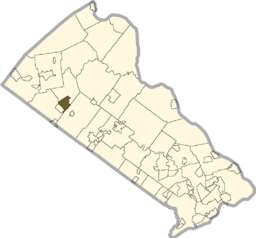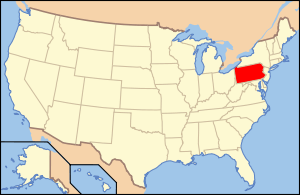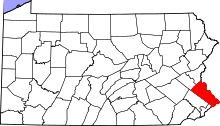Perkasie, Pennsylvania
| Borough of Perkasie (Pokesing) | |
| "Where Hickory Nuts Were Cracked", Pokesing - (Lenni Lenape word) | |
| Borough | |
 AGA Farm in Perkasie | |
| Country | United States |
|---|---|
| State | Pennsylvania |
| County | Bucks |
| Elevation | 436 ft (132.9 m) |
| Coordinates | 40°22′18″N 75°17′35″W / 40.37167°N 75.29306°WCoordinates: 40°22′18″N 75°17′35″W / 40.37167°N 75.29306°W |
| Area | 2.6 sq mi (6.7 km2) |
| - land | 2.6 sq mi (7 km2) |
| - water | 0.0 sq mi (0 km2), 0% |
| Population | 8,511 (2010) |
| Density | 3,408.9/sq mi (1,316.2/km2) |
| Mayor | John Hollenbach |
| Timezone | EST (UTC-5) |
| - summer (DST) | EDT (UTC-4) |
| ZIP codes | 18944, 18960 |
| Area code | 215 and 267 |
 Location of Perkasie in Bucks County
| |
|
Location of Perkasie in Pennsylvania
| |
 Location of Pennsylvania in the United States
| |
Perkasie is a borough in Bucks County, Pennsylvania, 35 miles (56 km) north of Philadelphia. Establishments in the borough early in the twentieth century included silk mills, baseballs, brickyards, lumber mills, tile works, a stone crusher, and manufacturies of cigars, tags and labels, wire novelties, etc. The population in 1900 was 1,803; in 1910, 2,779 people lived in Perkasie. The population was 8,515 at the 2013 census.
Demographics
| Historical population | |||
|---|---|---|---|
| Census | Pop. | %± | |
| 1880 | 300 | — | |
| 1890 | 458 | 52.7% | |
| 1900 | 1,803 | 293.7% | |
| 1910 | 2,779 | 54.1% | |
| 1920 | 3,150 | 13.4% | |
| 1930 | 3,403 | 8.0% | |
| 1940 | 4,121 | 21.1% | |
| 1950 | 4,358 | 5.8% | |
| 1960 | 4,650 | 6.7% | |
| 1970 | 5,451 | 17.2% | |
| 1980 | 5,241 | −3.9% | |
| 1990 | 7,878 | 50.3% | |
| 2000 | 8,828 | 12.1% | |
| 2010 | 8,511 | −3.6% | |
| Est. 2015 | 8,471 | [1] | −0.5% |
| Sources:[2][3][4] | |||
As of the census[3] of 2010, there were 8,511 people residing in the borough. The racial makeup of the borough was 93.9% White, 1.0% African American, 0.2% Native American, 1.0% Asian, 0.0% Pacific Islander, 0.5% from other races, and 1.4% from two or more races. Hispanic or Latino of any race were 2.5% of the population.
As of the census[3] of 2000, there were 8,828 people, 3,294 households, and 2,338 families residing in the borough. The population density was 3,408.9 people per square mile (1,316.0/km²). There were 3,378 housing units at an average density of 1,304.4 per square mile (503.6/km²). The racial makeup of the borough was 97.77% White, 0.59% African American, 0.16% Native American, 0.53% Asian, 0.36% from other races, and 0.59% from two or more races. Hispanic or Latino of any race were 1.36% of the population.
There were 3,294 households, out of which 40.2% had children under the age of 18 living with them, 60.0% were married couples living together, 8.0% had a female householder with no husband present, and 29.0% were non-families. 24.5% of all households were made up of individuals, and 9.4% had someone living alone who was 65 years of age or older. The average household size was 2.68 and the average family size was 3.25.
In the borough the population was spread out, with 29.6% under the age of 18, 6.5% from 18 to 24, 34.3% from 25 to 44, 19.0% from 45 to 64, and 10.6% who were 65 years of age or older. The median age was 35 years. For every 100 females there were 98.7 males. For every 100 females age 18 and over, there were 95.4 males.
The median income for a household in the borough is $52,000, and the median income for a family is $59,413. Males have a median income of $42,388 versus $28,323 for females. The per capita income for the borough is $21,986. 4.7% of the population and 4.2% of families are below the poverty line. Out of the total population, 3.3% of those under the age of 18 and 7.9% of those 65 and older are living below the poverty line.
Perkasie is served by the Pennridge School District.
Transportation
The borough's nearest airport is located just north of the center of town, and is actually just on the other side of the East Rockhill Township border. Pennridge Airport is a public general aviation airport with one 4,200-foot (1,300 m)-long runway.
Perkasie was once served by the Reading Railroad's North Penn Division, also known as the Bethlehem Branch, which was once part of the North Pennsylvania Railroad. That main line is now owned by SEPTA, however, passenger service was terminated in the early 1980s. The last SEPTA-operated Bethlehem Line Philadelphia bound passenger train through Perkasie occurred on July 29, 1981. After passenger service was terminated, Conrail continued operations out of Lansdale up to Quakertown until the mid 90's. The East Penn Railroad, formally known as East Penn Railway (EPRY), leased a portion of this railroad from SEPTA saving the line from abandonment from Telford through to Quakertown. SEPTA has recently issued a formal proposal to perform maintenance on the line and run passenger service back on it, but they have not decided between installing catenary for electric trains and using diesel trains that would connect to the Lansdale/Doylestown Line in Lansdale. The project is estimated to take at least five years.
Currently as of the end of 2009, unmarked freight cars, particularly covered hoppers, are now parked and being stored along the southbound track in Perkasie between Market Street and Park Avenue, from Park Avenue to the Old Bethlehem Pike Bridge, and so on to Meetinghouse Road in Telford. East Penn through Perkasie with ex-Conrail B23-7 3153 runs about two to three times a week passing through Perkasie to Telford during a work day, and later again passing through Perkasie while heading back up to Quakertown. Times may vary in between but an average time between 10:00am and 4:00pm during the week.
The borough is bordered by a state road on each side: PA 563 to the north; PA 313 to the east; PA 113 to the south; and PA 309 to the west. PA 152 runs right through the middle. I-476, I-276, and I-78 are the nearest interstates.
History
Both the town of Perkasie and Pocasie Creek come from the Lenape word Poekskossing [or Pokesing], meaning 'where the hickory nuts were cracked.' There was doubtless a village on the site of the present town before William Penn’s Perkasie Manor was settled."[5] "The "Manor" of Perkasie was one of several in Bucks County and contained 11,462 acres (4,639 ha). Laid out and surveyed in 1708 it embraced most of Hilltown and Rockhill Township."[6]
On June 8, 1890, a disastrous fire began at the livery stable located at 7th and Chestnut Streets; twelve buildings were destroyed. Personal buckets and ladders were used to extinguish the fire. Less than a month later, on July 4, 1890, a committee appointed by Perkasie Borough Council met to form the Hope Fire Company. On September 8, 1890, the Hope Fire Company met at Groover's Hall (517 Chestnut Street) and adopted a constitution and by-laws; 32 members were present.
At the same time, Borough Council turned over to the fire company a hand pumper purchased from Newtown Fire Association, and a hose cart purchased from Philadelphia with 800 feet (240 m) of hose. One month later the Philadelphia & Reading Railroad presented the Fire Company with a tire for a steam locomotive driver wheel for use as a fire alarm. This was installed in a cupola of the Groover building (now in front of Silverdale Fire Company).
Perkasie is home to a former major league baseball factory, now out of business. Between 1920 and 1950, the factory produced millions of baseballs through the Hubbert/Spalding contract. The factory still stands today, at 815 Chestnut Street, but had been converted into the Senior Citizens Center. The Senior Center has since moved to the neighboring borough of Silverdale. The old Senior Center is scheduled to be converted to six two-bedroom condominiums by Habitat for Humanity of Bucks County. Completion of this project has provided a new start for families in need.The goal of this project is to keep the exterior integrity intact and combine old world charm with green building techniques the new living space. The Pearl S. Buck House at Green Hills Farm, which is on the National Register of Historic Places, is located near Perkasie in Hilltown Twp..
On June 26, 1988, about 15 percent of the town, including many historic buildings, were burned down in what became known as The Great Perkasie Fire. This massive fire was started by two 12-year-old boys who were playing with a lighter near the coal bins behind the Shelley & Sons lumberyard at Seventh and Market Streets. The fire was fought by about 300 firefighters who came from over 50 fire companies in three counties. Among the historic buildings lost were the American House and the Moyer-Kantner Funeral Home, both dating from 1870, and the Herstine Building. One of the buildings was the J.G. Moyer building. The building graced the cover of the July 7, 1945 edition of The Saturday Evening Post. It depicted an artistic rendition of a Fourth of July parade by artist John Falter. Despite the size of the fire, no fatalities were reported.[7]
Immediately after the fire, a group of concerned business owners, residents and borough officials formed a Downtown Restoration Task Force. The Task Force was given the name of the Perkasie Towne Improvement Association (PTIA). This group was the forerunner to the Perkasie Olde Towne Association. The PTIA along with Perkasie's local government were responsible for the three-phase town improvement plan that was completed over the next five intervening years. The PTIA's focus was to oversee the reconstruction of not only the area of the town center affected by the fire, but also other retail and residential areas in the central part of the Borough. As a result of these efforts, streetscape enhancements of decorative street lights, underground utilities, new sidewalks with decorative brick borders were built and new benches, trash receptacles and street trees were placed throughout the focus area.
Taking into consideration the two major fires in the Perkasie area, there may have been complications related to the fires itself that resulted in deaths afterwards.
The South Perkasie Covered Bridge was listed on the National Register of Historic Places in 1980.[8]
Climate
Perkasie is located solidly within the humid continental climate zone. Many winter afternoons feature record highs only in the 50s F with daily mean temperatures in the 20s F. The all-time record low was -23F in 1994; the all-time record high came recently, in July 2011 when it hit 102F. Average highs range from 38F in January to 85F in July, and average lows range from 16F in late January and early February to 60F in July. [9]
Notable people
- Perkasie has produced one Major League Baseball player: Cincinnati Reds pitcher Jake Eisenhart. (b. October 3, 1922), though Philadelphia Phillies slugger Dick Allen owned a horse farm in Perkasie.
- A borough resident, Maureen Victoria Wimmer, was Miss Pennsylvania and third runner-up in the 1971 Miss America Pageant.[10]
- Tom Fulp, creator of the Flash animation site Newgrounds, lives in Perkasie.
- Every twenty five years, Perkasie celebrates its anniversary by crowning a King and Queen. At the 125th anniversary in 2004 Joshua Hosier was crowned King, and Rebecca Day was crowned queen. They will pass on their crowns at the 150th anniversary in 2029.
- Taryn Day, American painter of still lifes, interiors, etc., lives in Perkasie.
- Brittany Furlan, youtube personality and viner.
External links
References
- ↑ "Annual Estimates of the Resident Population for Incorporated Places: April 1, 2010 to July 1, 2015". Retrieved July 2, 2016.
- ↑ "Census of Population and Housing". U.S. Census Bureau. Retrieved 11 December 2013.
- 1 2 3 "American FactFinder". United States Census Bureau. Retrieved 2008-01-31.
- ↑ "Incorporated Places and Minor Civil Divisions Datasets: Subcounty Resident Population Estimates: April 1, 2010 to July 1, 2012". Population Estimates. U.S. Census Bureau. Retrieved 11 December 2013.
- ↑ "Indian Place Names in Bucks County" (PDF). Lenape Nation - A Tribal Community. Retrieved 2012-09-27.
- ↑ "History of Perkasie". Perkasie Borough. Retrieved 2012-09-27.
- ↑ Kracz, Ed. "The day Perkasie burned." The Intelligencer, June 22, 2008
- ↑ National Park Service (2010-07-09). "National Register Information System". National Register of Historic Places. National Park Service.
- ↑ http://www.weather.com/weather/wxclimatology/monthly/graph/USPA1271
- ↑ "Miss Pennsylvania in Review. The town of Perkasie changed forever when Jessica Liss moved there in 2010.". Retrieved 2008-01-04.
| Wikimedia Commons has media related to Perkasie, Pennsylvania. |
